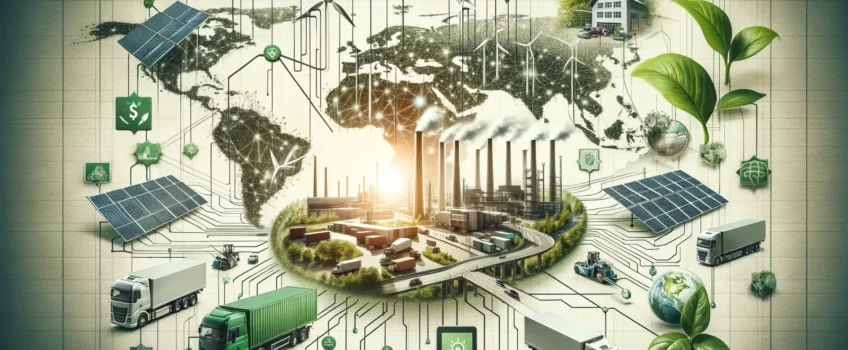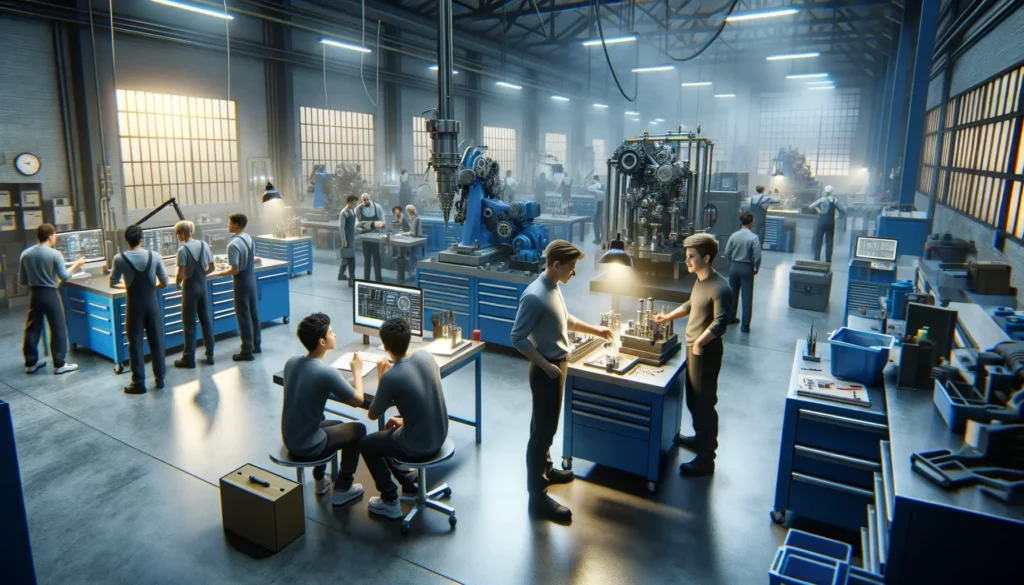
Engineering a Sustainable Future: The Role of Supply Chain Decarbonisation
Ahead of COP28, the engineering sector is recognising the pivotal role of supply chain decarbonisation in mitigating climate change. Graham Hoare, CEO of the Manufacturing Technology Centre (MTC), emphasises the necessity of robust supply chains in expediting decarbonisation efforts. The UK’s commitment to green energy, specifically in nuclear, green hydrogen, and renewables, is crucial for both achieving net zero goals and fostering the growth of a green economy. Here’s a closer look at how we can accelerate supply chain decarbonisation.
The Importance of Supply Chain Decarbonisation
The manufacturing and production processes of goods and services are responsible for a significant portion of global greenhouse gas emissions. As companies strive to reduce their carbon footprint, the focus has shifted towards greening their supply chains. This involves reducing emissions from transportation, sourcing materials sustainably, and implementing best practices.
The sustainability of green energy supply chains hinges on resilient, competitive structures underpinned by skilled workforces adept in advanced technologies. The government’s investment in engineering and manufacturing apprenticeships, as announced in the Advanced Manufacturing Plan, is a step towards building this future talent pipeline. However, current workforce development, including upskilling in digital transformation and advanced automation, is equally vital.
Collaboration across industries is key in advancing supply chain decarbonisation. The automotive sector, for example, has formed the UK Automotive Council to facilitate knowledge sharing and innovation towards sustainable supply chains. This cross-sectoral partnership approach can yield valuable insights and accelerate progress towards decarbonisation goals.
What Are The Main Challenges To Supply Chain Decarbonisation?
Some potential challenges in accelerating supply chain decarbonisation include the cost of implementing sustainable practices, limited availability of green technologies and materials, and a lack of standardised assessment methods for measuring carbon emissions across supply chains. To address these challenges, governments can provide incentives for businesses to invest in sustainable solutions, support research and development for new green technologies, and establish industry-wide standards for carbon measurement.
Key Strategies for Effective Supply Chain Decarbonisation
Global Collaboration in Decarbonisation Efforts
The acceleration of decarbonisation through supply chains necessitates a collaborative global approach. Different regions and countries bring unique strengths and technologies to the table. This diversity is crucial in developing innovative solutions and sharing best practices in supply chain management. By leveraging global expertise and resources, the pace of decarbonisation can be significantly increased, leading to more efficient and sustainable practices worldwide.
Recommended: Sustainable Automotive Manufacturing for a Green Future
Technology and Innovation as Catalysts
Technology plays a transformative role in supply chain decarbonisation. Innovations in logistics, material sourcing, manufacturing processes, and waste management contribute to reducing carbon footprints. The integration of Artificial Intelligence (AI), IoT, and blockchain technology, for instance, can optimise supply chain operations, enhance transparency, and improve decision-making processes. These technological advancements are key in making supply chains more sustainable and less carbon-intensive.
Adapting to Regulatory Changes and Market Demands
As governments worldwide impose stricter regulations on carbon emissions and environmental sustainability, supply chains must adapt rapidly. This adaptation involves not only compliance with legal requirements but also responding to increasing market demands for greener products and practices. Businesses that proactively align their supply chains with these changing norms not only mitigate risks but also gain a competitive advantage in the market. This proactive approach also fosters a culture of innovation and responsibility, driving further advancements in decarbonisation efforts.
Sustainable Sourcing and Circular Economy
A key aspect of supply chain decarbonisation involves shifting towards sustainable sourcing and embracing the principles of a circular economy. This means selecting suppliers who prioritise eco-friendly practices and materials, and designing products with their entire lifecycle in mind. By implementing circular economy principles, companies can significantly reduce waste, recycle materials, and minimise their overall environmental impact. This approach not only benefits the planet but also offers economic benefits through resource efficiency and potential new revenue streams from recycled materials.
As engineering and manufacturing companies strive to reduce their carbon emissions, they must also ensure fair working conditions and responsible sourcing practices throughout their supply chains. This requires transparent communication between all stakeholders involved in the supply chain, from raw material suppliers to end consumers.
Supply Chain Decarbonisation and the Circular Economy
To accelerate decarbonisation, companies must consider not only their direct emissions but also those embedded within their supply chains. This requires a holistic approach to supply chain management, encompassing transparency, collaboration, and innovation. Tools such as life cycle assessment can aid in identifying hotspots for carbon emissions and inform decision-making towards sustainable procurement and operations.
Moreover, circular economy principles are gaining momentum in driving supply chain decarbonisation. By designing products and services with end-of-life considerations, businesses can reduce waste and emissions while promoting resource efficiency. This approach also opens up opportunities for new business models, such as product-as-a-service, which can further accelerate the transition to a circular economy.
Recommended: How To Create A Sustainable Supply Chain
Boosting Skills and Innovation: The UK’s Investment in Engineering Apprenticeships
The UK government’s commitment to reinforcing the nation’s industrial prowess is clearly reflected in its significant investment in engineering and manufacturing apprenticeships, as part of the Advanced Manufacturing Plan. This initiative represents a strategic move to cultivate a new generation of skilled professionals, vital for maintaining the competitive edge of the UK’s manufacturing sector. By focusing on apprenticeships, the plan aims to address the skills gap, ensuring that the workforce is well-equipped with the technical knowledge and practical experience required in the rapidly evolving manufacturing landscape.
This investment is not just a nod to the traditional strengths of British manufacturing, but also a forward-looking approach that anticipates the future needs of the industry. It encompasses a range of disciplines, from classic engineering roles to cutting-edge areas like green technology and digital manufacturing. The plan recognises that the future of manufacturing is intertwined with technological advancements, and therefore, prioritising education and training in these areas is crucial for sustainable growth.
The ripple effect of this initiative is expected to be significant, boosting job creation, driving innovation, and reinforcing the UK’s position as a leader in advanced manufacturing on the global stage.
Conclusion
As the world enters a new era of engineering, supply chain decarbonisation will remain a crucial focus for businesses in all industries. With continued investment in talent development, adoption of circular economy principles, and collaboration across sectors, we can collectively accelerate the transition to a low-carbon future. Research technology organisations like MTC are at the forefront, turning research into viable commercial projects.
As engineers, it is our responsibility to drive sustainable innovation and lead the way towards a greener world for generations to come. For companies in these sectors, embracing emerging technologies and integrating them across supply chains is essential for reducing carbon emissions and tackling climate change effectively.
For more articles on the latest advancements in engineering, manufacturing, and technology, make sure to follow our blog. You can also join the conversation on Twitter (X), Facebook and LinkedIn using the hashtag #PRVtech.


 Mail:
Mail: 




